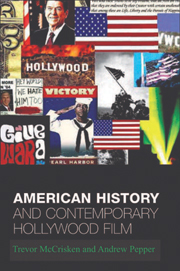Book contents
- Frontmatter
- Contents
- Acknowledgements
- Preface
- Introduction
- 1 Lessons from Hollywood's American Revolution
- 2 Rattling the chains of history: Steven Spielberg's Amistad and ‘telling everyone's story’
- 3 Hollywood's Civil War dilemma: to imagine or unravel the nation?
- 4 Saving the Good War: Hollywood and World War II in the post-Cold War world
- 5 Oliver Stone and the decade of trauma
- 6 From Civil Rights to Black Nationalism: Hollywood v. black America?
- 7 Hollywood's post-Cold War history: the ‘righteousness’ of American interventionism
- Select Bibliography
- Index
6 - From Civil Rights to Black Nationalism: Hollywood v. black America?
Published online by Cambridge University Press: 05 August 2013
- Frontmatter
- Contents
- Acknowledgements
- Preface
- Introduction
- 1 Lessons from Hollywood's American Revolution
- 2 Rattling the chains of history: Steven Spielberg's Amistad and ‘telling everyone's story’
- 3 Hollywood's Civil War dilemma: to imagine or unravel the nation?
- 4 Saving the Good War: Hollywood and World War II in the post-Cold War world
- 5 Oliver Stone and the decade of trauma
- 6 From Civil Rights to Black Nationalism: Hollywood v. black America?
- 7 Hollywood's post-Cold War history: the ‘righteousness’ of American interventionism
- Select Bibliography
- Index
Summary
If contemporary filmmakers have felt compelled to do away with the explicit racism of pre-Civil Rights Hollywood movie-making and make African-Americans the subjects rather than the objects of their gaze, then the vexed question of how successfully have their ambitions been realised needs to be addressed. For while there has long been a slow trickle of ‘worthy’ films made by white liberal directors whose integrationist politics usually requires initially hostile black and white protagonists to put aside their differences and prejudices and join forces to tackle some kind of ‘outside’ threat (that is, In the Heat of the Night, Mississippi Burning and The Hurricane), there has also been a small but growing number of films made by African-American directors (that is, Spike Lee, Mario Van Peebles) whose focus is predominantly African-American subjects and which tend to privilege conflict and confrontation rather than reconciliation and assimilation. Do the Right Thing, Malcolm X, Panther and Dead Presidents would be examples of this type of film.
Such a distinction has provoked scholars like Manthia Diawara and Ed Guerrero to differentiate between what they refer to as ‘Black independent cinema’ or ‘a new black film wave’ and mainstream Hollywood cinema, although Diawara in particular is careful to draw attention to the multiple ways in which ‘mainstream cinema … feeds on independent cinema and appropriates its themes and narrative forms’. Nonetheless, despite such cross-fertilisation, the appropriateness of such a distinction, for Guerrero at least, remains. The lines of demarcation are clear.
- Type
- Chapter
- Information
- American History and Contemporary Hollywood Film , pp. 160 - 186Publisher: Edinburgh University PressPrint publication year: 2005



